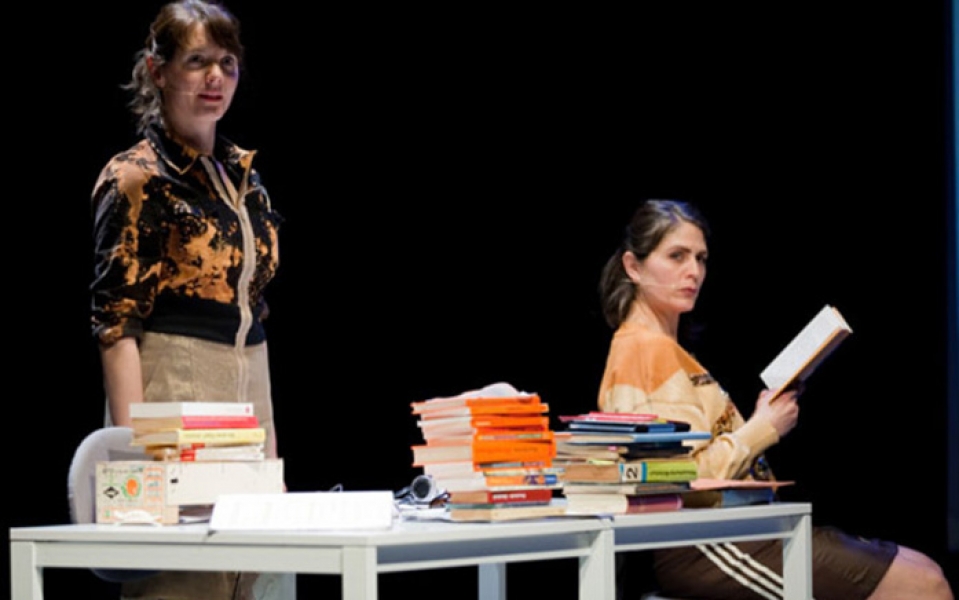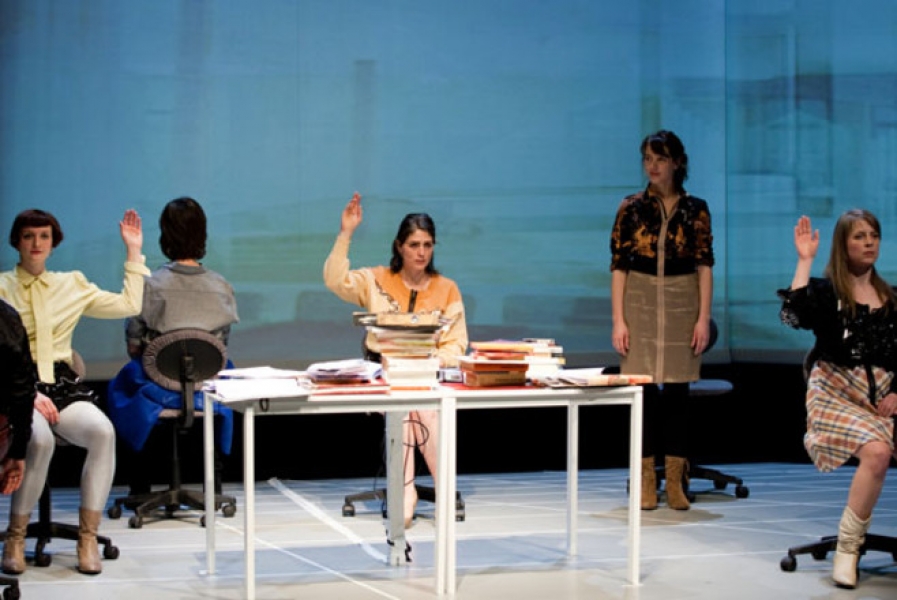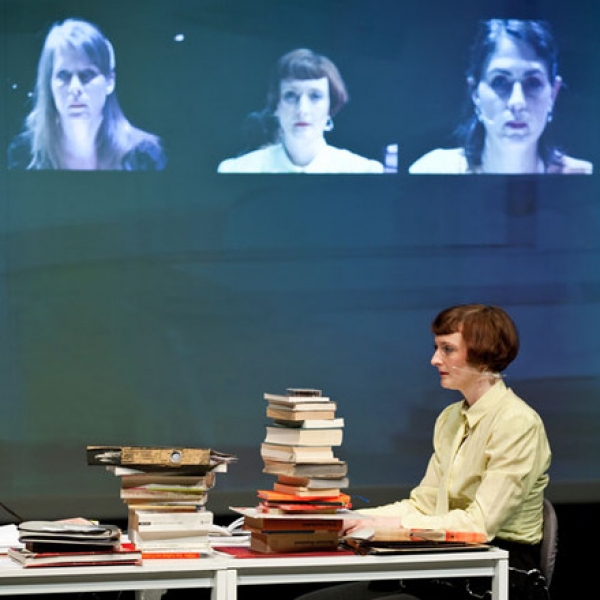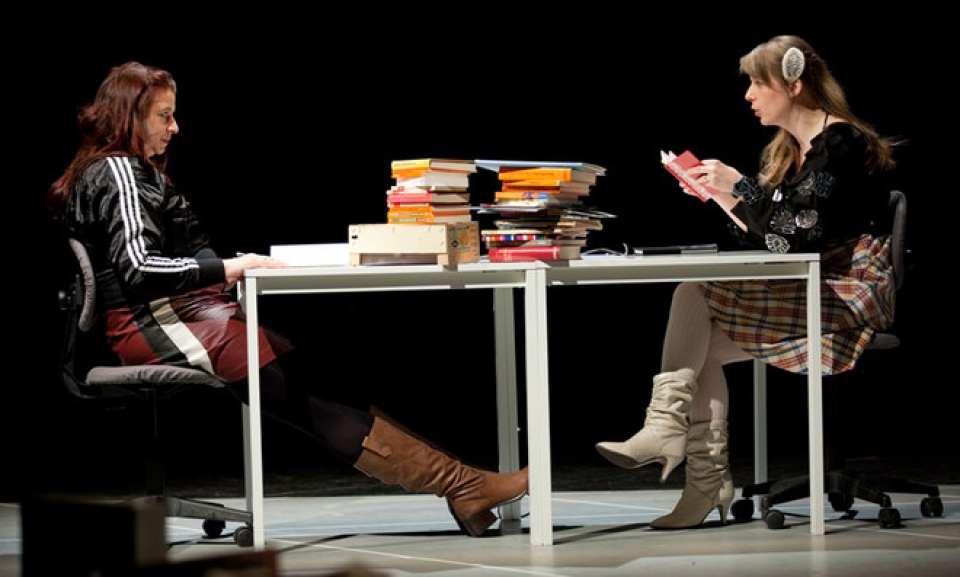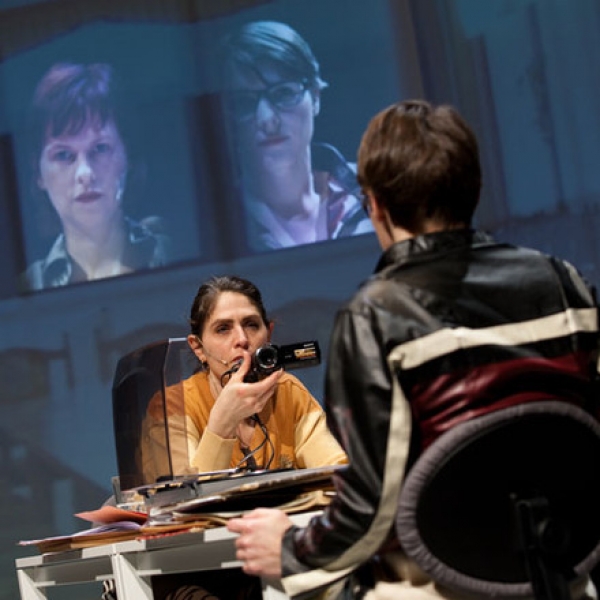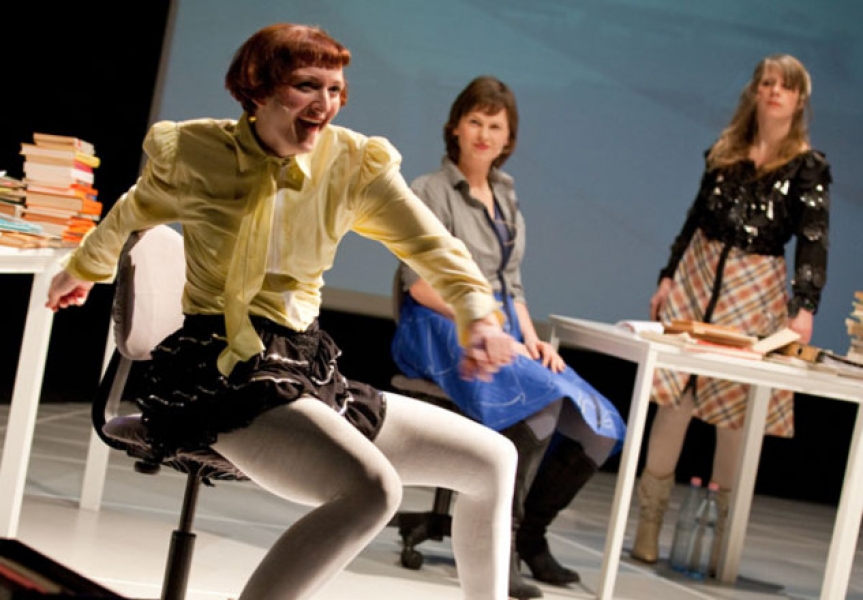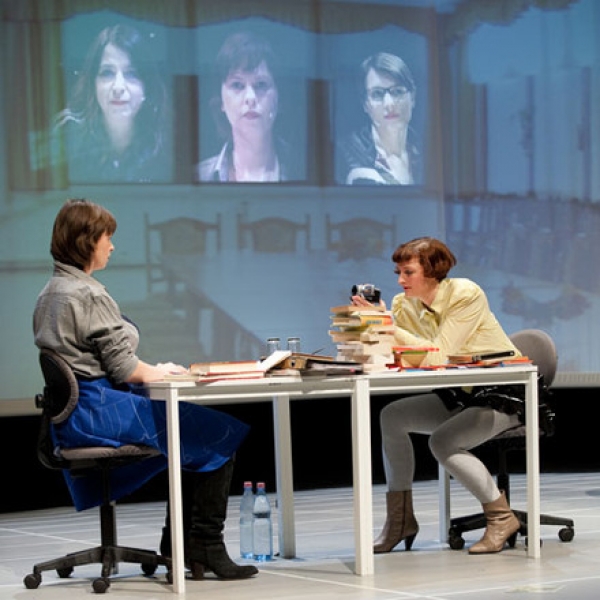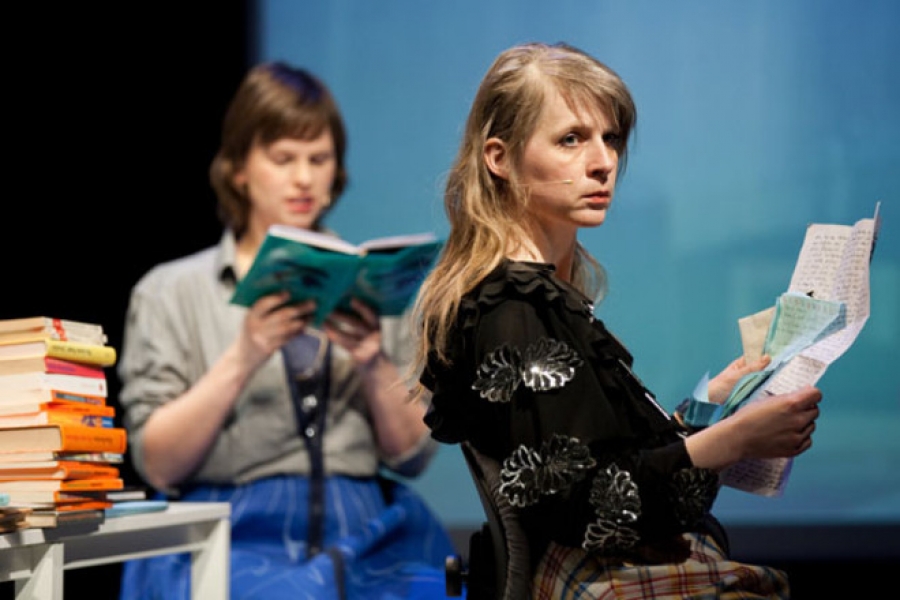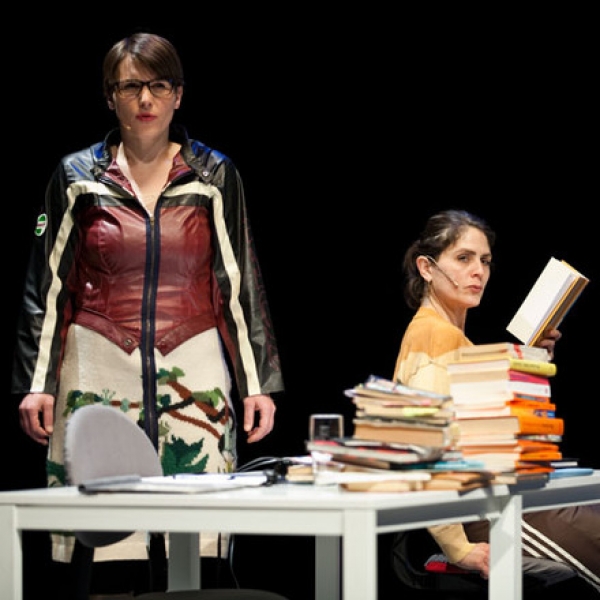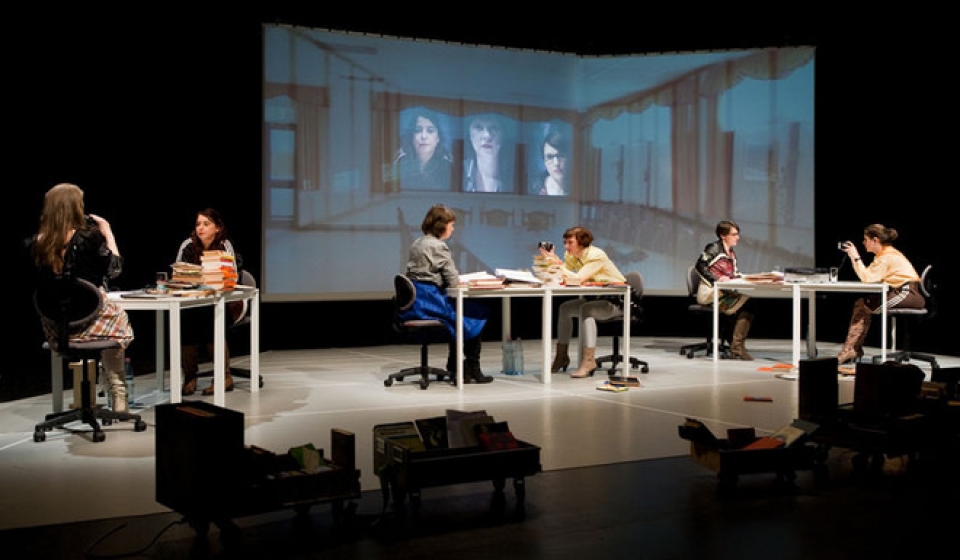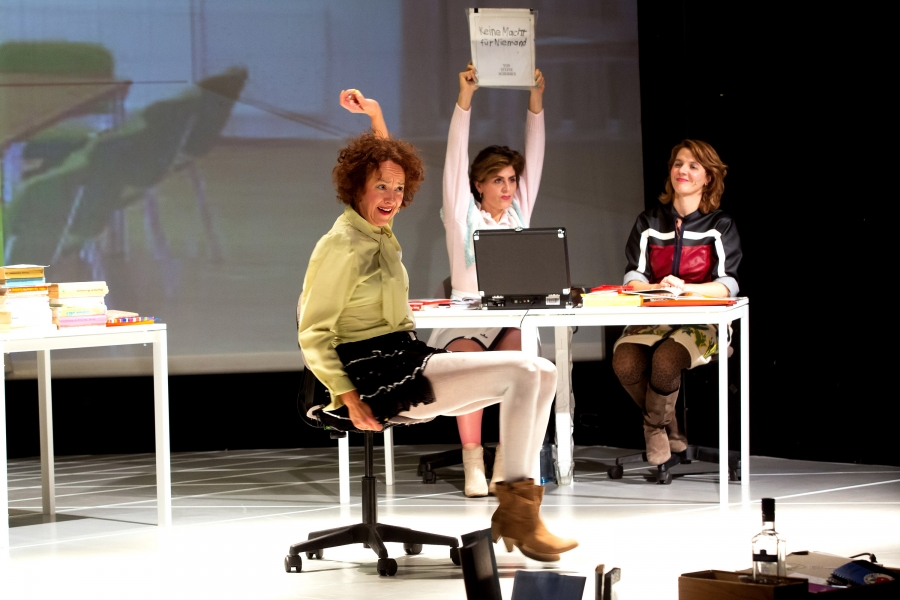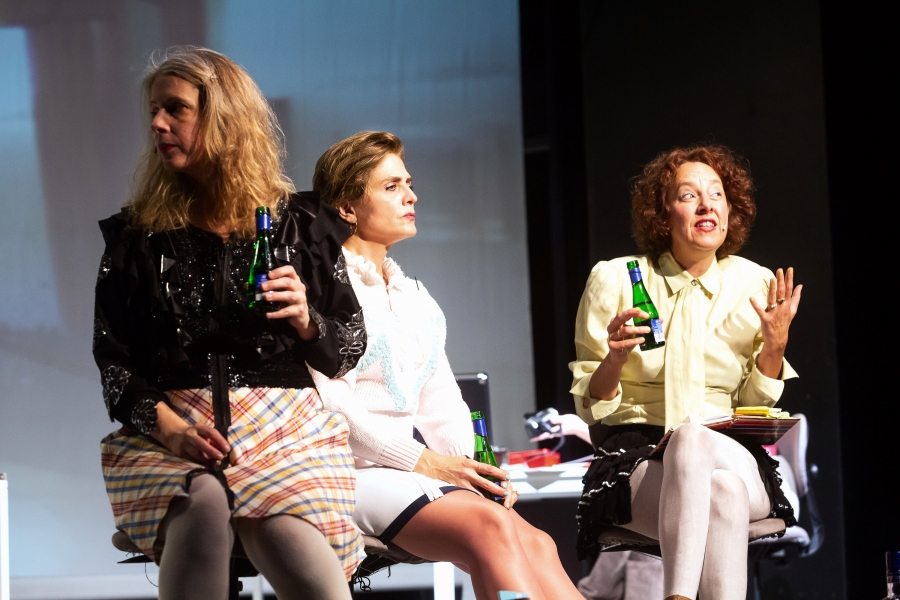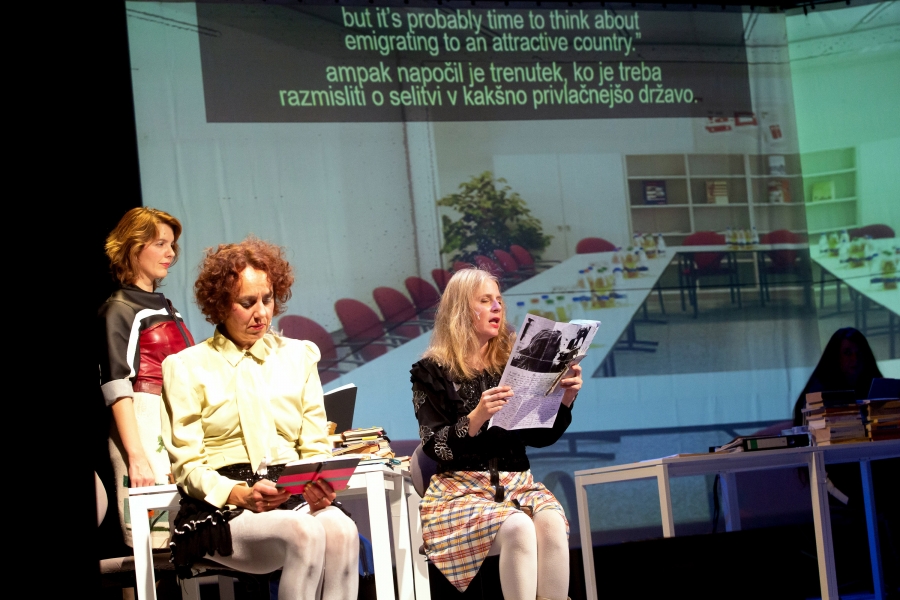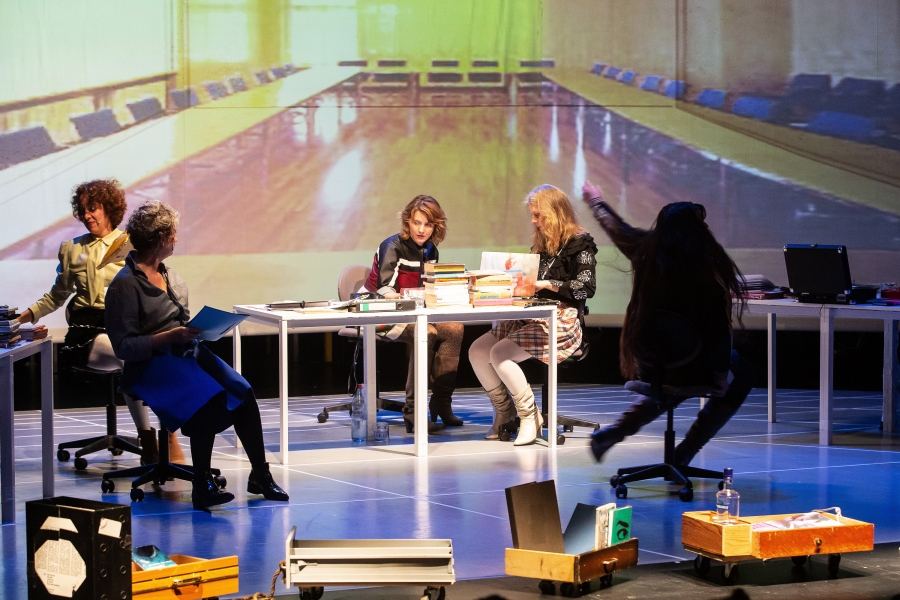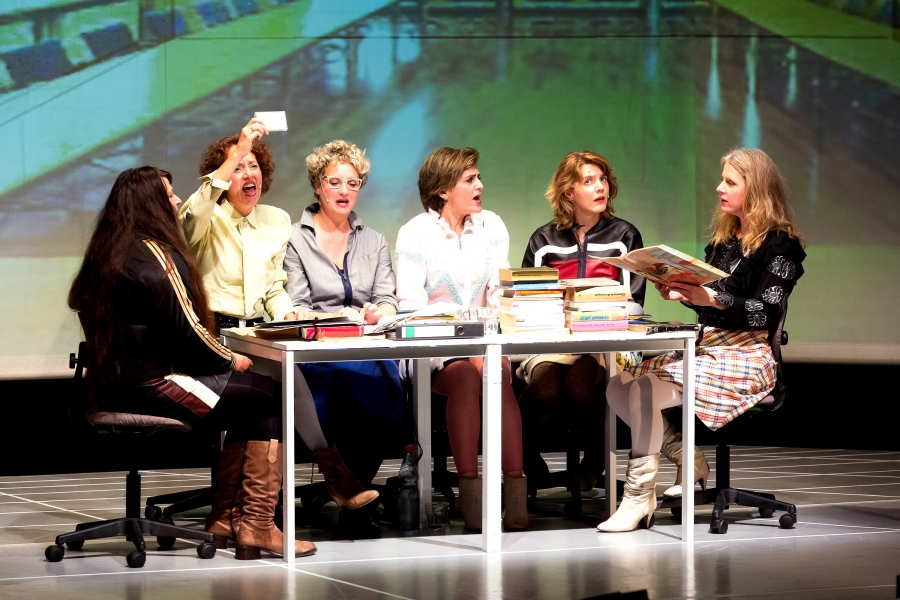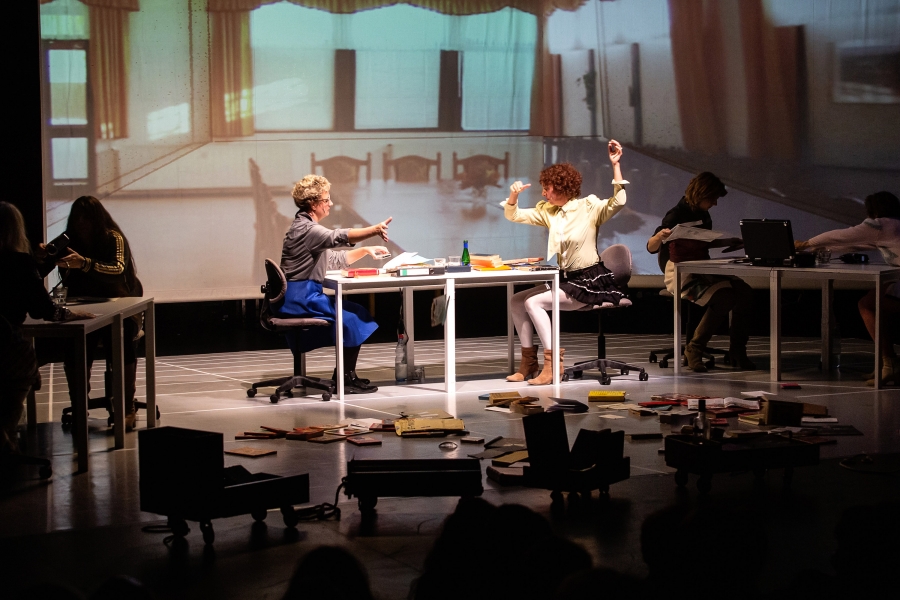Drawers
In Drawers, She She Pop (all of whom were raised in West Germany) meets several adversaries raised in the East onstage in order to open up each other’s drawers. A collective biography of the last 40 years should emerge from the personal materials of the performers.
Letters, excerpts from journals, and other personal text documents will be roughly chronologically sorted as well as literature, political texts, each performer’s internal image repertoire, and music. Night after night, the material from the lives of the 3 East-born and 3 West-born performers will be recombined, read aloud, and published. Questions about the other side must be answered as best they can. A history of the East-West German division will be told live, backed up by private and/or publically available text sources, and refereed by memories either in harmony with or contrary to the two great mid-twentieth century worldviews.
She She Pop and their Eastern colleagues search for the objective in the private. They avow polyphony, collective narration. Gaps, incommensurabilities, imprecisions, and missing links are a part of their system. Who were we? Who are we? Why have we become who we are?
Credits
Concept: She She Pop.
With: Sebastian Bark, Johanna Freiburg, Barbara Gronau, Annett Gröschner, Fanni Halmburger, Alexandra Lachmann, Katharina Lorenz, Lisa Lucassen, Mieke Matzke, Peggy Mädler, Ilia Papatheodorou, Wenke Seemann, Berit Stumpf and Nina Tecklenburg.
Dramaturgical Advice: Kaja Jakstat. Sets: Sandra Fox. Costumes: Lea Søvsø. Light Design: Sven Nichterlein. Sound Design: Florian Fischer. Video: Sandra Fox and Branka Pavlovic and She She Pop. Surtitles: Panthea (David Maß). Coordination and Support: Fanny Frohnmeyer, Kaja Jakstat, Ruschka Steininger. Technical Tour Support: Florian Fischer, Manuel Horstmann, Andreas Kröher, Michael Lentner, Sven Nichterlein, Torsten Schwarzbach. Production/PR: ehrliche arbeit – freelance office for culture. Freelance Communication Support: Tina Ebert. Financial Administration: Aminata Oelßner. Company Management: Elke Weber.
Thanks to Anja Dürrschmidt and Marion Müller-Roth.
A She She Pop production.
In Co-Production with the Hebbel am Ufer Berlin, Kampnagel Hamburg, FFT Düsseldorf and brut Wien.
premiere, March 2012, HAU, Berlin
Funded by the City of Berlin, the City of Hamburg, the Fonds Darstellende Künste e.V and the Rudolf Augstein Foundation.
Awards
Nominiert für die Ubu Awards in der Kategorie “Beste ausländische Performance” (Italien).
Dates
past dates:
Press
… just yell “Off to the Baltic Sea“ and East German women will promptly strip off their clothes and run naked looking for the shoreline. So say their West German counterparts gossiping over a glass of Prosecco. In the East, however, gossip is done over vodka. These are the… mercilessly recognizable stereotypes used by the six women … to judge and denounce one another. This self-irony runs throughout the entire piece… This clever humour … also reveals something that is however often overlooked in daily life. The degree to which our biographies, even those traits that we feel to be entirely individual, are shaped by growing up in a specific environment and how difficult it is… to shed this conditioning.
Matthias Bischoff, Frankfurter Allgemeine Zeitung, 1.10.2015
East and West are really only then sisters in spirit when the subject turns to Katharina Witt … and lo and behold, East and West roll along on their office chairs, full of verve and devotion, as if the wheels were skates. But other than that? At all other times the Ossi and Wessi women in She She Pop’s “Schubladen” still consider each other quite strange and a little uncanny …. The “Schubladen” perspective on their own (female) socialisation is pretty funny, but not without a caustic sting to it: three Ossi and three Wessi women sit facing one another for two cheerful hours, asking questions, digressing and settling scores…. Memories are rolled in on handcarts, (school)books, records, diaries, friendship books… The talk revolves around West German care packages (if only the damn Westerners would have packed tampons), as well as favourite music (Tanita Tikaram, oh my, whatever happened to her?). It is about the ways that East-German and West-German women remember the fall of the wall – or have no memory of it at all. It is about vodka or prosecco: the latter is only drunken by those Wessi wussies. It is about what was really written in those feminist (West) and socialist (East) books and whether they could be believed. It is about freedom and sex. The temporal distance to the anecdotes, quotes, music titles unearthed here, is in itself the source of much mirth… the matter-of-fact, even dry tone of the six actresses adds to the humour.
Sylvia Staude, Frankfurt Rundschau, 1.10.2015
…Finally making their debut on a Greek Stage after taking Europe by storm the collective, which specialises in works that dissect social rituals and media systems, the group brings personal experience to the force with candor and spontaneity. She She Pop place individual conflict into a historical standpoint, portraying the German reunification as a sort of couples therapy, in an effort to mend a broken relationship.
Vangelis Tsonos, Athens Views, 03.07.2015
In terms of the body, it clearly interests the performers so much that they understand how to deal with it perfectly. ‘My gynecologist says she can recognize women from West Germany instantly in a sauna: they’re shaved everywhere‘, said a member of the East German team, for example. ‘West German women are like this’, ‘East German women are like that’: in both camps, the group of six have a good time making fun of such notions. The West German women question their feeling of superiority that is so firmly anchored that you no longer notice that East German women do not have any “ostalgie” but are also not fascinated by the Western model. (…) The members of She She Pop understand how to find the proper form, as simple as it is penetrating. The East Germany – West Germany debate takes place in front of a giant screen at the back of the stage upon which images of empty meeting rooms are projected. Who can say whether these come from the world of bureaucratic East Germany from the technocratic reunified Germany of today? Fabienne Darge, LE MONDE, 16.10.2014 The texts provoke and and are fun in their subtle hubris and finesse. And: The individual is what counts, for the Ego in this prevailing historic framework takes the place of the sovereign. … it is not about judging the systems but rather about their structure. Very nice!
Magarete Affenzeller, Standard, Vienna, 09.02.2013
Reviews of the premiere in Italy, july 2012
If every summer has its theatrical revelations, then the summer of 2012 had Schubladen, a unique plot by a no less unique company, the Berlin collective She She Pop: … a living family album, which transforms into an articulate collective self-portrait. This rummaging around in memories is refreshingly new, ironic and has a clarity that is almost anthropological.
Renato Palazzi, Il Sole 24 Ore, 26.07.2012
She She Pop surprise the audience with their natural presence on stage and a rare measure of interpretation that presents and practices political theater anno 2000. A wonderful discovery.
Maria Grazia Gregori, L’Unità, 24.07.2012
Back to work with She She Pop, a female collective from Berlin, which was announced with much fanfare. In Schubladen, the most important occurrence in late 20th century European history, the German reunification, becomes a terrain that mirrors individual identities. Everything is revived in the memories of insignificant incidents taken from the lives of the six performers (love affairs, parents, friends, school, …). As they sit on office chairs at three tables, books, records, diaries, etc. serve as props to constantly question each other, give comment, indulge in memories, speak their minds (…) both those from the socialist East, as well as from the capitalist West – in a completely unforgiving way. This creates an inner simultaneity, which is highly interesting in an age of dramaturgical experimentation.
Anna Bandettini, La Repubblica, 22.07.2012
Reviews of the premiere, march 2012
The performers manage to interweave their own personal biographies with the general relationship of West and East Germans. Here, taking one’s pulse doesn’t mean forgetting the rest of the world. Quite a tall order. She She Pop manage this balancing act in a way that is both amusing as well as smart.
taz Hamburg, 24./25. March 2012, Klaus Irler
The Olympic skating program of the Ice Princess Kati “Schubladen” is no simple attempt to review the East-West German past, but rather a string of associated thoughts about what made us what we are. An amusing and profound evening that stays with you long after the show has ended.
Tom Mustoph, taz Berlin – die tageszeitung, 10.03.2012
Shared Images of Femininity There seems to be a kind of consensus concerning Katharina Witt no matter where people come from. Anyhow, when the East and West German women on stage mention the former GDR Olympic medalist, all socio-cultural differences, which so far dominated the evening, seem to vanish into thin air. And the long-legged West woman Nina Tecklenburg revives Witt’s Carmen choreography in grand gestures on her office chair from childhood physical memory. Sitting down. The Rittberger is accomplished with ease in an office chair pirouette. Soon, she is joined by Wenke Seemann from East Germany, whose body seems to be able to recall the pertinent choreographic volte-faces just as spontaneously. And so the two of them whirl more or less synchronized across the stage on their office chairs. Occasionally, they are pushed into the background by the other four irritated co-performers. But rarely for long. For there’s no cure for such avid expressions of enthusiasm. Not with the audience cheering them on… The evening is impressive for its rhythmic timing and the sophisticated symbolism of the costumes chosen for the six ladies. It is easy to glide through the evening on the waves of pretty stories, pleasant music and whitecaps of well-placed punch lines.
Esther Slevogt, Nachtkritik.de, 8.03.2012
A chronicle of East-West German Histories In “Schubladen”, three pairs of women from former East and West Germany interview each other about their childhoods and teenage years. Such a piece, could offer enough enticing incentive to simply reproduce existing clichés of hands-on, hard-drinking, sexually active East German women and consumer chicks from the West. However, here at the Hebbel am Ufer in Berlin, the artist collective She She Pop has produced something completely different. Here two sides of a coin have not simply come together, because they belong together: She She Pop does not linger in the usual German-German tittle-tattle about differences and similarities, but instead explores fundamental ideological and practical everyday differences expressed in language itself … from the point at which music comes into play, this highly nostalgic rummaging in “compartments” (Schubladen) leaves the audience first smiling and then rocking with liberating laughter.
Eberhard Spreng, Deutschlandradio Kultur, 10.03.2012
She She Pop rummages in autobiographical “Compartments” at the HAU in Berlin. Anett Gröschner, a delightfully sarcastic author … stands on the stage of HAU 2 in Berlin and speaks prosaically, sometime slightly bemused about the strange coincidences and impertinences, she faced living in Germany – a whole basket of little, glistening snapshots. She is one of the six protagonists – next to Alexandra Lachmann, Wenke Seemann, Ilia Paptheororou, Johnanna Freiburg and Nina Tecklenburg – of “Schubladen” (Compartments). In this new piece by the performance collective She She Pop, the stage is mainly filled three tables. Two women – one from former East-Germany, one from the former West – sit across from each other at each table. They interview each other about their pasts and rummage around in the biographic compartments and drawers of memory only to discover once again how different or similar memories of childhood and first loves, self-definitions, tastes in music, sexual orientations or their relationships to money feel depending on what part of the country they grew up in. But once the group arrives at a veneration of Heiner Müller, so typical of such circles, and put on a record by the widely accepted band “Ton Steine Scherben”, Germany’s inner unity is restored. Watching six middle-age performers head-banging enthusiastically to Rio Reiser’s “Wir müssen hier raus, wie leben im Zuchthaus…”, while rolling across the stage on their chairs, has its own charm. This German-German summit meeting could have become terribly didactic, but the HAU being what it is, this is no exchange of empty catchphrases, but rather open explorations, with all the embarrassments that diaries (for example) have to offer. When West-German upper-class degeneration clash with East-German question marks (“now be honest, are you parents capitalists?”) and clichés merrily escalate, the situation develops its own idiosyncratic humor. Fortunately the performers are prone to voices their diagnoses with a candid joy for mutual discrimination … In “Schubladen”, She She Pop continue their series of autobiographical research projects, which has by now – after the enormous success of “Testament” together with their fathers – become a genre of its own. The attraction of “Schubladen” is the combination of amusingly or touchingly irritating moments and the unpretentious theatrical concept situated somewhere between traditional pedagogy, monolog, never-ending research project, party and not entirely serious partnership therapy. The self-centered interest in personal identity has a narcissistic streak that is typical for Berlin’s creative class. But She She Pop is smart enough to avoid the pitfalls of vanity, by exhibiting these exercises on self-reflection with nonchalant irony. The tendency to partition life into short anecdotes and the limited degree of new insight gained by the audience is more than compensated for by the cheerfulness that the evening produces.
Peter Laudenbach, Süddeutsche Zeitung, 12.03.2012
